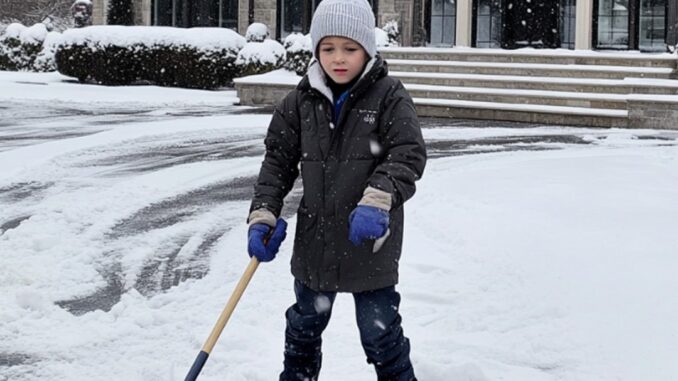
When my 12-year-old son Ben agreed to shovel snow for our wealthy neighbor Mr. Dickinson for $10 a day, he was overjoyed. His plan was simple: earn enough money to buy thoughtful gifts for the family. But when Mr. Dickinson refused to pay, calling it a “lesson in contracts,” Ben was devastated. That’s when I decided it was time for a lesson of our own—a lesson in accountability.
Ben had always had a heart bigger than his years. At just 12, his determination could humble grown men. Still, I never imagined I’d be standing with my husband in the freezing cold, enacting a plan to teach our neighbor that cheating a child wasn’t just bad business—it was personal.
It started one crisp December morning. Ben, cheeks flushed from the cold, burst into the kitchen where I was making breakfast.
“Mom! Mr. Dickinson said he’ll pay me $10 every time I shovel his driveway!” His face was glowing with pride.
Mr. Dickinson, our insufferably wealthy neighbor, was known for his arrogance. He reveled in flaunting his luxurious lifestyle, from the sleek sports cars in his garage to the extravagant holiday parties in his mansion. Letting Ben shovel his driveway was probably, in his mind, some sort of charitable gesture.
“That’s fantastic, sweetheart,” I said, tousling his hair. “What are you going to do with all that money?”
Ben’s expression grew serious—one of those rare moments when childhood excitement gives way to a glimpse of maturity. “I’m going to buy you a scarf. And a dollhouse for Annie.”
He then described, with intricate detail, the scarf he had in mind—red with tiny snowflake patterns—and the dollhouse his little sister had been dreaming about, complete with working lights and tiny furniture.
My heart swelled. “You’ve really thought this through, haven’t you?”
He nodded. “I’m also saving the rest for a telescope.”
And so, for the next few weeks, Ben transformed into a determined winter soldier. Every morning before school, bundled in his oversized coat and knit hat, he would head out with his shovel. From the window, I’d watch him tackle Mr. Dickinson’s driveway, the rhythmic scrape of metal on pavement echoing through the frosty air.
Despite the cold, Ben never complained. He returned home each day with stiff fingers, rosy cheeks, and a triumphant smile.
“How was it today?” I’d ask, handing him a steaming cup of hot chocolate.
“Good! I’m getting faster,” he’d reply, shaking snow from his coat.
He meticulously tracked his earnings in a worn notebook, calculating how close he was to his goal. By December 23rd, Ben was buzzing with excitement—just $20 away from the telescope.
But that morning, he came home far earlier than usual, slamming the door with trembling hands. Tears clung to his lashes as he stammered, “Mr. Dickinson… he said he’s not paying me.”
“What?” I knelt beside him, trying to stay calm. “What do you mean?”
“He said it’s a lesson. That I should’ve gotten a contract.” His voice cracked. “Mom, I worked so hard. Why would he do this?”
The injustice of it hit me like a punch to the gut. How could someone exploit a child’s hard work as a “business lesson”?
I hugged Ben tightly. “You did everything right, honey. This is on him, not you. Don’t worry—I’ll take care of it.”
Fueled by fury, I stormed over to Dickinson’s glowing mansion. The man answered the door with a glass of wine in hand, smirking.
“Mrs. Carter, what can I do for you?”
“You can start by paying Ben what you owe him,” I said, barely containing my anger.
He chuckled, sipping his wine. “No contract, no payment. That’s business.”
The smugness in his tone sent my blood boiling, but I forced myself to remain calm.
“You’re right,” I said sweetly, turning to leave. “The real world is about accountability. Enjoy your evening, Mr. Dickinson.”
The next morning, I rallied my family. “We’re going to right a wrong today,” I announced.
Bundled up, we took to our yard—and then to Dickinson’s driveway. But instead of clearing it, we moved every pile of snow from our sidewalk and driveway directly onto his.
By the time we were done, Dickinson’s sleek black car was buried under a mountain of snow taller than the hood.
When he stormed over, his face was as red as the Christmas lights on his house. “What have you done to my driveway?” he roared.
“Oh, Mr. Dickinson,” I said with mock sweetness. “This is quantum meruit. It means if you refuse to pay for someone’s work, you don’t get to enjoy the benefit of it.”
His face contorted with disbelief and anger, but the gathering neighbors, quietly cheering us on, made it clear he was outnumbered.
By the evening, he begrudgingly handed over an envelope with $80 in cash, mumbling an apology.
When Ben opened it, his face lit up brighter than any Christmas tree. “Thanks, Mom,” he said, hugging me tightly.
“No, Ben,” I whispered, ruffling his hair. “Thank you for reminding me what it means to stand up for what’s right.”
Leave a Reply